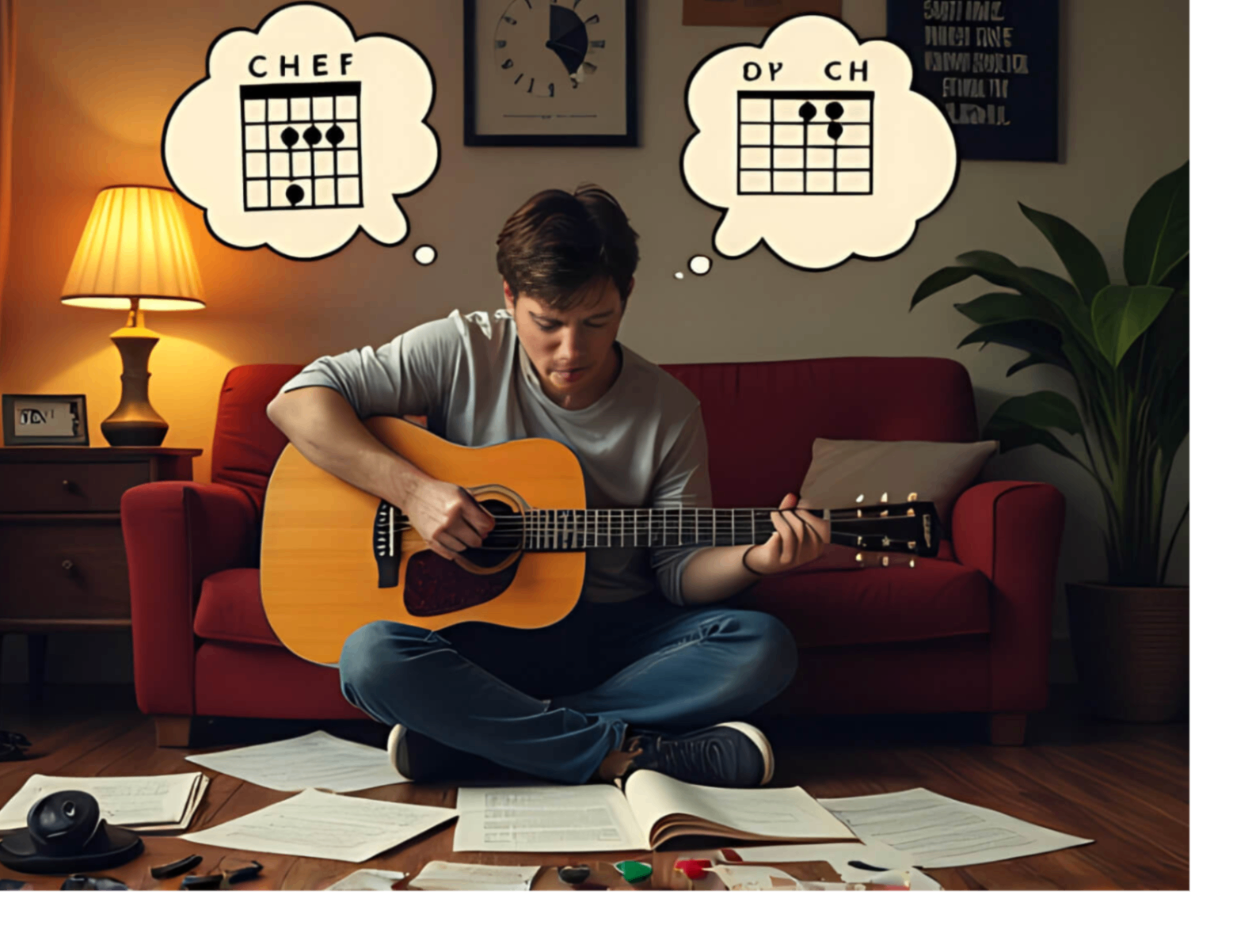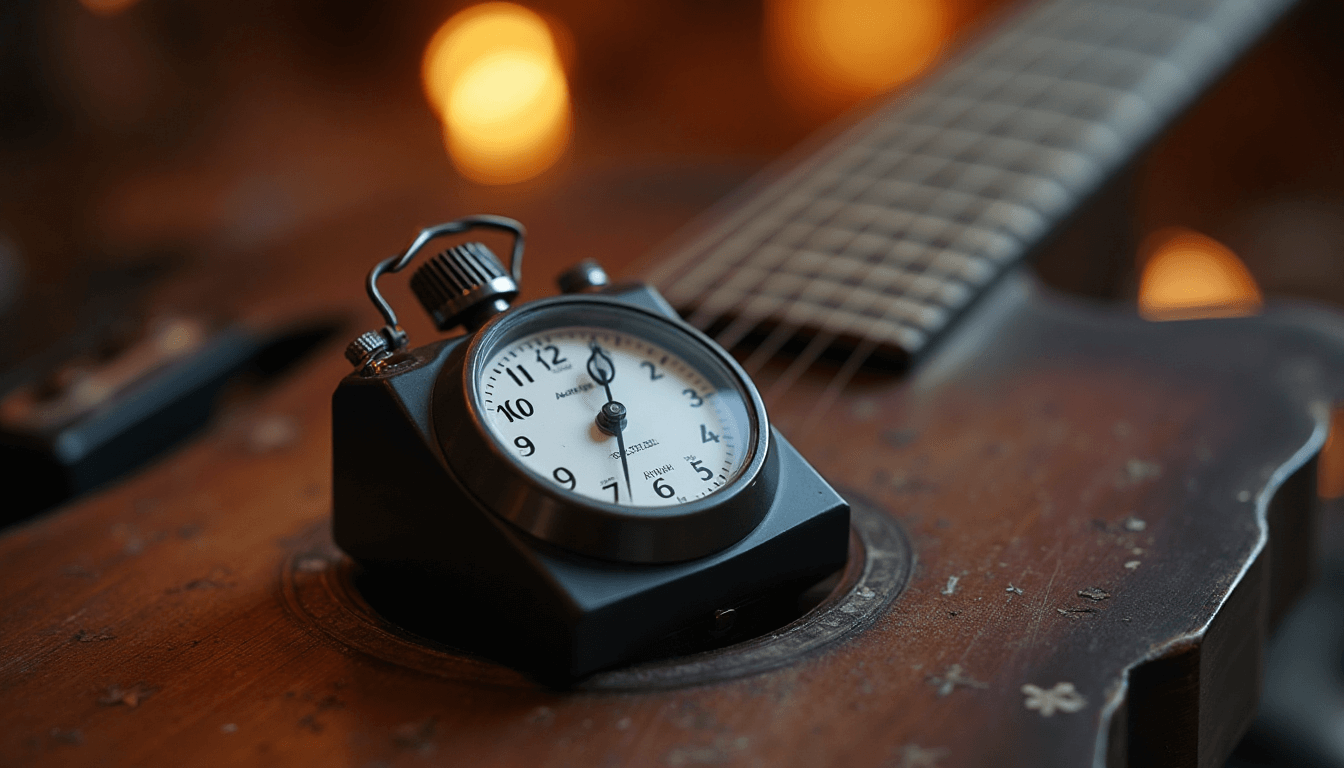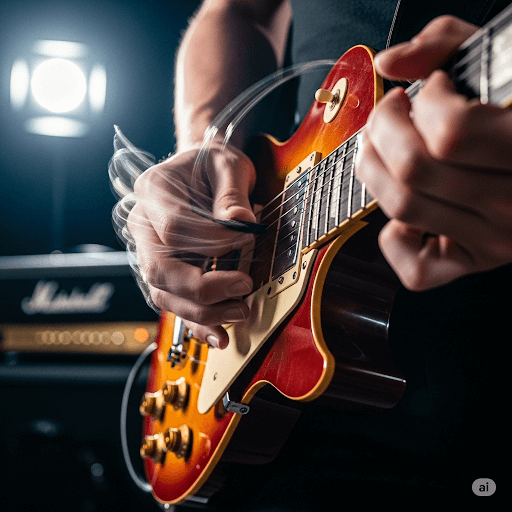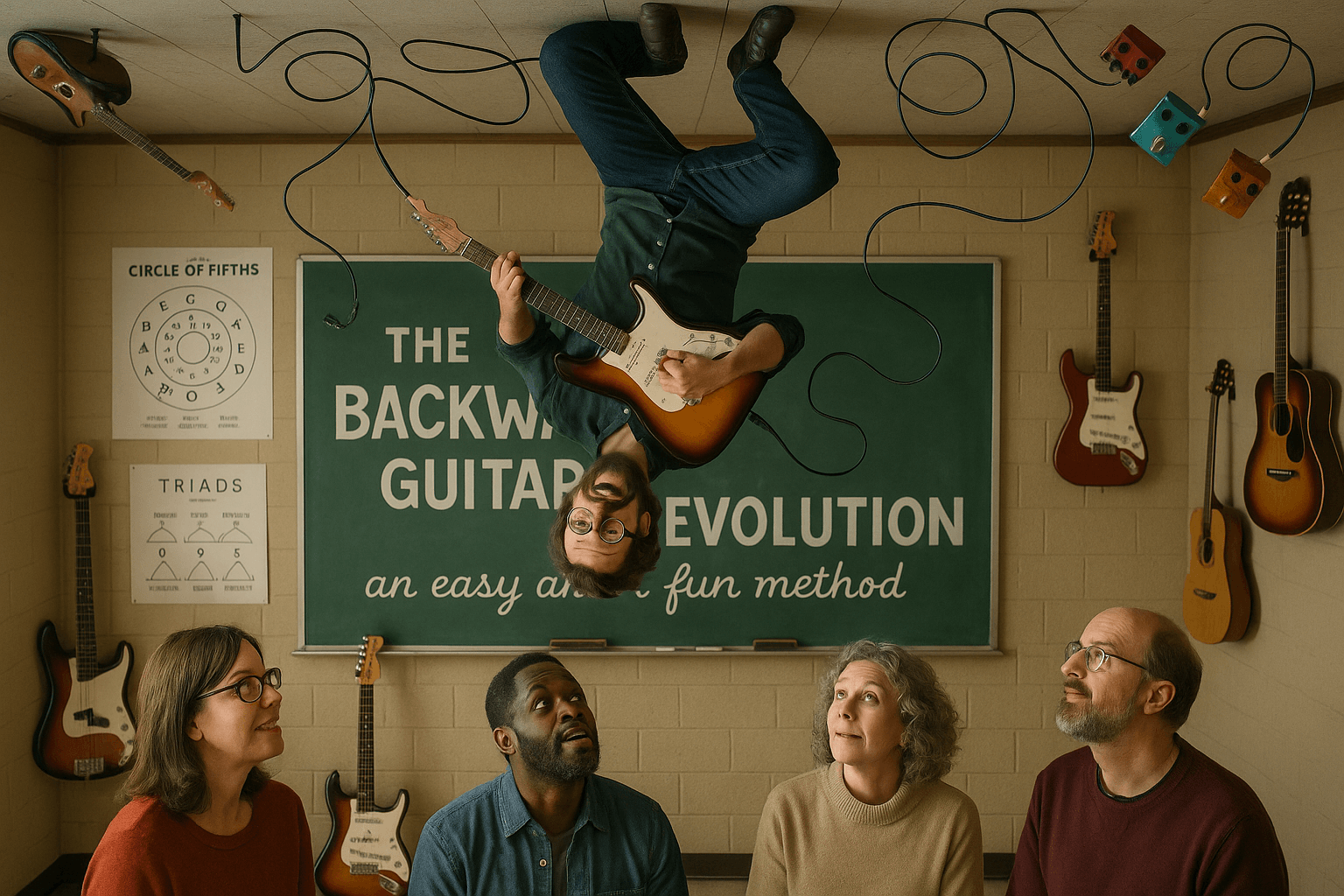Oct 18, 2024 01:39:05 PM
Feeling Stuck? 6 Reasons for No Progress in Guitar Learning

You may feel stuck in your guitar journey due to lack of practice, unclear goals, or ineffective learning methods. Poor motivation, inadequate feedback, or physical limitations can also hinder your progress.
Many guitarists face stagnation, feeling frustrated and unmotivated. Progress often slows down, leading to discouragement. Understanding the root causes of this stagnation is crucial for overcoming it. Whether you're a beginner or an experienced player, identifying specific barriers can help you regain momentum.
This article explores six common reasons for lack of progress in guitar playing. By addressing these issues, you can find effective solutions and reignite your passion for music. Let’s dive into the reasons and discover how to overcome these challenges together.
The Plateau Of Guitar Playing
The plateau of guitar playing can feel frustrating. Many players reach a stage where progress halts. Skills seem stagnant despite practice. Understanding this plateau is essential for growth.
Symptoms Of A Guitar Plateau
Recognizing the signs of a plateau can help you move forward. Here are common symptoms:
- Limited improvement: Skills don’t seem to get better.
- Repetitive practice: You play the same songs or exercises.
- Lack of motivation: You feel unexcited to practice.
- Frustration: Small mistakes become more noticeable.
- Difficulty learning new songs: You struggle with new material.
Common Feelings Among Stagnant Players
Many players experience similar emotions during a plateau. Here are some common feelings:
- Frustration: Feeling annoyed with slow progress.
- Doubt: Questioning your ability to improve.
- Isolation: Feeling alone in your struggles.
- Disappointment: Feeling let down by your own progress.
- Burnout: Feeling tired of practicing without results.
Understanding these feelings can help you break free. Recognizing a plateau is the first step. With the right approach, you can reignite your passion for guitar.
Lack Of Practice Structure
A clear practice structure is essential for progress on the guitar. Without a plan, improvement stalls. Many players struggle due to random practice habits. A lack of structure leads to frustration and slow growth.
The Pitfalls Of Random Practice
Random practice can feel unproductive. It often includes:
- Jumping between songs
- Ignoring difficult sections
- Practicing only favorite parts
This chaos creates several problems:
- Wasted Time: Hours spent with little to show.
- Frustration: Difficulty leads to discouragement.
- Poor Skill Development: Skills may stagnate or regress.
Random practice lacks focus. Without focus, progress remains elusive.
Designing An Effective Practice Schedule
Creating a structured practice schedule boosts progress. Here’s how to design one:
- Warm-up Exercises | 10 mins | Improve finger dexterity
- Technique Practice | 15 mins | Master specific techniques
- Song Practice | 20 mins | Work on new pieces
- Improvisation | 15 mins | Boost creativity
Follow these routine for an effective schedule. Stay committed to your schedule. Consistency leads to progress.
Inadequate Goal Setting
One major reason is inadequate goal setting. Without clear goals, it's hard to measure progress. Goals give direction and purpose. Without them, practice can feel aimless.
The Importance Of Clear Objectives
Clear objectives are essential for effective practice. They help you focus on what matters. Here are some benefits of having clear goals:
- Motivation: Goals inspire you to practice regularly.
- Focus: Objectives guide your practice sessions.
- Achievement: Goals make it easier to track progress.
- Confidence: Reaching goals boosts your self-esteem.
Set specific objectives to turn practice into progress. Think about what you want to achieve. Do you want to learn a song? Improve a technique? Write these down.
Smart Goals For Guitarists
Using the SMART framework helps create effective goals. SMART stands for:
- Specific: Define your goal clearly. Avoid vague statements.
- Measurable: Include numbers to track your progress.
- Achievable: Set goals that are realistic for your skill level.
- Relevant: Ensure your goals align with your musical interests.
- Time-bound: Set a deadline to keep yourself accountable.
For example, instead of saying, "I want to play better," say:
"I will learn to play ‘Tujhe Dekho To Ye Jaana Sanam’ in three weeks."
This goal is specific, measurable, achievable, relevant, and time-bound. Start setting SMART goals today. Watch your guitar skills improve. Clear objectives make all the difference.
Limited Genre Exposure
Limited genre exposure might be the reason. Sticking to one style can hinder progress. Exploring different musical genres opens new doors. Variety helps you grow as a musician.
Benefits Of Exploring New Musical Styles
Exploring new genres offers many benefits:
- Improved Skills: Each genre has unique techniques.
- Increased Creativity: Mixing styles sparks fresh ideas.
- Broadened Understanding: Learn music theory from diverse perspectives.
- Enhanced Listening Skills: Different genres develop your ear.
- Networking Opportunities: Meet other musicians with varied tastes.
Incorporating Variety Into Your Repertoire
Adding variety to your playing can be simple:
- Choose a new genre to explore.
- Learn a song from that genre. Bollywood or English, doesn't matter.
- Practice techniques unique to that style. Try chord switching, starting leads, strumming patterns, etc.
- Join groups or forums focused on that genre. Check out Youtube, Online lessons, UltimateGuitar, etc.
- Attend live performances to get inspired. Seeing artists perform in unison will open key perspectives.
Try mixing genres in your practice. Combine rock with blues. Blend blues with funk. Embrace new sounds and techniques.
Technical Skill Imbalances
Many guitarists face challenges due to technical skill imbalances. These imbalances can stop progress. They create uneven playing, leading to frustration. Recognizing and fixing these issues is crucial for growth.
Identifying Your Weaknesses
Start by assessing your skills. Identify areas where you struggle. Common weaknesses include:
- Finger strength
- Speed and agility
- Coordination between hands
- Chords and scales
Try recording yourself. Listen for uneven playing. Ask for feedback from friends or teachers. Keep a journal of your practice. Note which areas need more work.
Exercises To Achieve Technical Equilibrium
Focus on exercises that help balance your skills. Here are effective methods:
- Finger Independence: Practice scales with one finger at a time. Why? Builds finger strength and dexterity.
- Metronome Practice: Play scales at different speeds. Why? Improves timing and consistency.
- Alternate Picking: Use up and down strokes on each note. Why? Enhances speed and control.
- Chord Transitions: Practice switching between common chords. Why? Improves smoothness in playing.
Set a practice schedule. Spend time on each exercise. Consistency leads to improvement. Celebrate small victories. They will keep you motivated.
Neglecting Musical Theory
Many guitar players hit a wall due to neglecting musical theory. This knowledge opens doors to creativity and understanding. Without it, progress stalls. Learning theory can significantly enhance your skills. Let's explore the role of theory in mastering the guitar.
The Role Of Theory In Guitar Mastery
Musical theory provides the foundation for playing guitar. It helps understand notes, chords, and scales. Here are some key benefits:
- Improved Creativity: Understand how to create your own music.
- Better Improvisation: Play freely in different styles.
- Enhanced Sight-Reading: Read sheet music with confidence.
- Informed Songwriting: Craft songs that resonate with listeners.
Grasping these concepts leads to better playing. Players who know theory often progress faster.
Resources For Learning Music Theory
Many resources exist to learn musical theory. Here are some top choices:
- Books provide Clear explanations and exercises. Format could be Print or eBook
- Online Courses provide Structured lessons with videos. Format could be Web-based
- YouTube Channels provides Free tutorials on various topics. Format would be Video
- Apps provide Interactive games and quizzes. Use in any Mobile or tablet device
Choose resources that suit your learning style. Mixing different formats keeps it engaging. Start today to unlock your potential.
Inconsistent Feedback And Guidance
One more big reason is inconsistent feedback. Without proper guidance, progress slows down. It becomes hard to identify mistakes. This can lead to frustration and a lack of motivation. Finding a reliable source of feedback is crucial. It can help you improve faster. You need constructive criticism to grow as a musician. Let's explore how to get better guidance.
Finding A Mentor Or Teacher
A mentor or teacher can change your guitar journey. Plus learning with them gives you real-time feedback which is crucial for progressing in the right manner. Here are some ways to find one: check local music schools, search online for virtual lessons, ask friends for recommendations, or join local music groups or forums. Look for teachers who have good reviews, specialize in your preferred style and provide personalized lessons preferably in an in-person setting. Regular sessions with a teacher boost your skills. They offer tailored advice and keep you accountable.
Using Feedback To Propel Your Playing
Feedback is essential for improvement. Use it wisely to enhance your playing. Here are some tips:
- Record your practice sessions.
- Listen to your recordings critically.
- Ask your mentor for specific feedback.
- Set measurable goals based on feedback.
Utilizing feedback can lead to - improved technique by focusing on areas needing work, increased confidence by feeling more assured in your skills, and faster progress by learning more in less time. Feedback can be the key to moving forward. Embrace it and see how far you can go.
Overcoming Plateaus With Mindset Shifts
Feeling stuck on your guitar journey is common. It happens to many players. Shifting your mindset can help break through these plateaus. A positive approach makes learning enjoyable and effective.
Embracing The Learning Curve
Guitar playing is a skill that takes time. Embracing the learning curve is essential. You have to start accepting mistakes as part of learning, celebrating small achievements and focusing on progress, not perfection. Every guitarist faces challenges. Understanding this helps build resilience. Each struggle teaches valuable lessons.
Staying Motivated During Slow Progress
Slow progress can be frustrating. Keeping your motivation high is crucial. Try these strategies:
- Set realistic goals.
- Mix up your practice routine.
- Join a community of fellow players.
Connecting with others inspires growth. Watching others succeed can energize you. Remember, every guitarist has their own pace. Set goals that provides direction and focus. Change routine that prevents boredom and stagnation. Join a community or jam session that will provide the encouragement and support from others.
Putting Solutions Into Action
The right actions can turn your situation around. Here are two key steps to help you move forward.
Creating A Personalized Action Plan
A personalized action plan sets clear goals. Here’s how to create one:
- Identify Your Goals: Decide what you want to achieve. This could be learning a song or mastering a technique.
- Break It Down: Divide your goals into smaller tasks. For example, practice chords or scales daily.
- Set a Schedule: Allocate specific times for practice. Consistency is key to improvement.
- Adjust as Needed: If something isn’t working, change it. Flexibility helps you stay motivated.
By following these steps, you create a clear path to success.
Tracking Progress And Celebrating Milestones
Tracking progress keeps you motivated. Celebrate each small victory. Here’s how to do it:
- Keep a Practice Journal: Write down what you practice each day. This helps you see your growth.
- Record Yourself: Listen to your playing over time. This shows how much you've improved.
- Set Milestones: Choose specific achievements to celebrate. Examples include learning a new song or performing for friends.
- Reward Yourself: Treat yourself when you hit a milestone. This keeps the journey enjoyable.
Tracking and celebrating makes the process fun. You stay engaged and excited about your guitar progress.
Conclusion
Progress in your guitar journey can feel frustrating at times. Identifying the reasons behind your stagnation is crucial. By addressing these six key areas, you can unlock your potential. Remember, consistent practice and a positive mindset are essential. Embrace the journey, and soon you'll see the improvements you desire. Never stop playing!

The 15-Minute Guitar Ritual That Transforms Beginner Guitarists without Endless Practice

Guitar Picking Mechanics: Master Speed and Dexterity Today

The Backwards Guitar Revolution: Why I Turned Traditional Teaching Upside Down